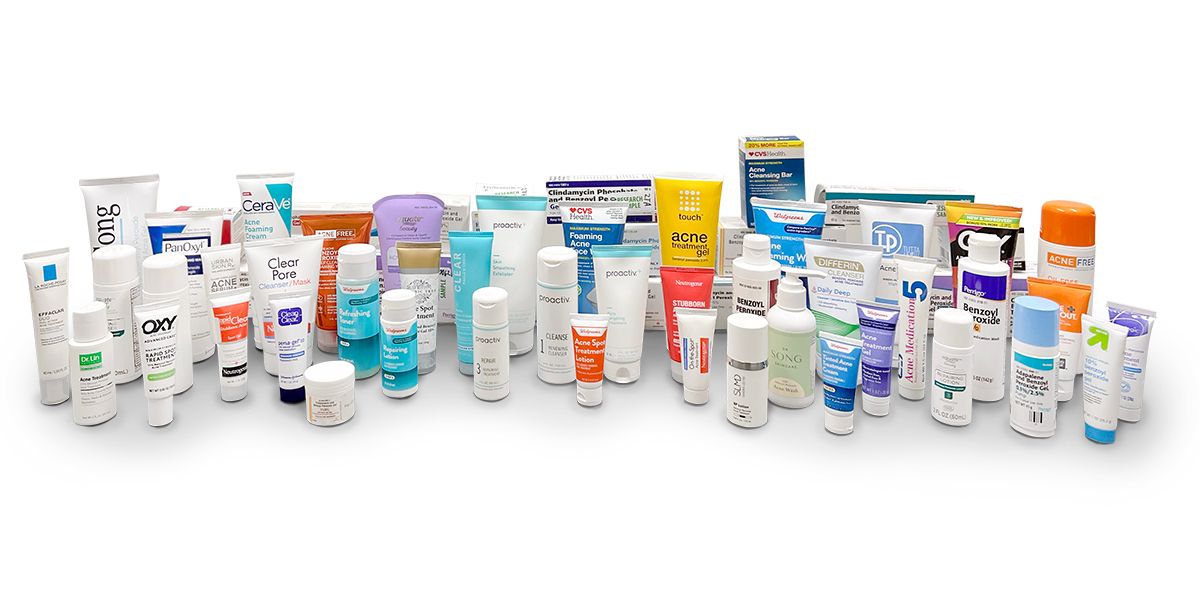Benzene found in multiple acne treatment products
Results from a recent laboratory test revealed benzene was found in multiple benzoyl peroxide acne products.
Valisure, an independent testing laboratory, tested 99 benzoyl peroxide (BPO) acne products and found the presence of benzene, a human carcinogen known to cause blood cancers, in nearly all the BPO products.1
Benzoyl peroxide acne products© Valisure

The FDA’s current guidelines allow for no more than 2 parts per million of benzene. However, Valisure’s test investigating the degradation of BPO acne products found that these products can form over 800 times the FDA concentration limit of benzene (when stored for 2 weeks at 50°C). Moreover, benzene was also detected in the air surrounding the incubated BPO products, demonstrating that benzene has the possibility to leak out of some products and pose an inhalation risk.
"There is not a safe level of benzene that can exist in any skin care product, over the counter or prescription,” said Christopher Bunick, MD, PhD, associate professor of dermatology at Yale University. “The current data on BPO degrading into high levels of benzene is extremely concerning given its prominent use in skin care, and this study should serve as another wake-up call for improved manufacturing and quality control of consumer health care products.”
These results follow multiple FDA Citizen Petitions published by Valisure over the past several years, including detecting benzene in hand sanitizers, sunscreens, dry shampoos, and antiperspirants. In 2023, the FDA introduced a new guidance urging manufacturers to reformulate certain products containing “carbomer” gelling agents, which pose a risk of benzene contamination.2
A few of the affected products include:3
- Proactiv 2.5% BPO cream
- Walgreens 10% BPO bar
- Clinique 2.5% BPO cream
- Clearasil 10% BPO cream
- La Roche-Posay 5.5% BPO cream
- PanOxyl 10% BPO cream
- Equate 10% BPO cream
- Differin 5% BPO cream
- CeraVe 4% BPO cream
- TARO 2.5% BPO gel
In a press release announcing the discovery, the company stated, “Valisure’s tests on dozens of prescription and over-the-counter benzoyl peroxide products suggest that currently formulated BPO medications are fundamentally unstable and can generate unacceptably high levels of benzene when handled or stored at higher temperatures that the products may be exposed to during handling by consumers. Benzene can be produced in the product itself and potentially escape into the surrounding air. Therefore, Valisure is requesting an investigation and market withdrawal of BPO-containing products.”
References:
- VALISURE DISCOVERS BENZOYL PEROXIDE ACNE TREATMENT PRODUCTS ARE UNSTABLE AND FORM BENZENE. Valisure. March 6, 2024. Accessed March 6, 2024. https://www.valisure.com/valisure-newsroom/valisure-detects-benzene-in-benzoyl-peroxide
- Reformulating drug products that contain carbomers manufactured with benzene. FDA December 27, 2023. Accessed March 6, 2024. https://www.fda.gov/regulatory-information/search-fda-guidance-documents/reformulating-drug-products-contain-carbomers-manufactured-benzene
- FDA Citizen petition. Valisure. March 5, 2024. Accessed March 6, 2024. https://assets-global.website-files.com/6215052733f8bb8fea016220/65e8560962ed23f744902a7b_Valisure%20Citizen%20Petition%20on%20Benzene%20in%20Benzoyl%20Peroxide%20Drug%20Products.pdf
Recognize & Refer: Hemangiomas in pediatrics
July 17th 2019Contemporary Pediatrics sits down exclusively with Sheila Fallon Friedlander, MD, a professor dermatology and pediatrics, to discuss the one key condition for which she believes community pediatricians should be especially aware-hemangiomas.